You can find depression relief through virtual reality by choosing immersive environments like peaceful gardens that boost positive emotions, engaging in behavioral activation through VR games and virtual tours, practicing cognitive restructuring in safe digital scenarios, participating in virtual group activities to combat isolation, incorporating physical movement with VR fitness programs, using avatar therapy to address negative self-talk, and establishing a consistent treatment schedule with at least three weekly sessions. These evidence-based techniques will release VR’s full therapeutic potential for your mental wellness journey.
Choose Immersive Environments That Promote Positive Emotions

When you’re selecting VR environments for depression relief, you’ll want to focus on spaces that naturally evoke positive emotions and feelings of well-being. Immersive environments like virtual gardens and serene beaches create therapeutic effects by engaging your brain’s reward system.
Virtual gardening activities particularly stimulate feelings of joy and happiness, making them ideal if you’re experiencing anhedonia.
Virtual gardening in VR can reignite joy and happiness for those struggling with anhedonia’s emotional numbness.
Choose engaging scenarios such as virtual tours through peaceful landscapes or interactive games that encourage participation. These experiences help alleviate depressive symptoms while boosting motivation.
Customizable VR experiences allow you to tailor environments to your personal preferences, enhancing the therapeutic benefits.
The positive virtual interactions you have can translate into increased motivation for real-world social engagement, creating a bridge from virtual enjoyment to actual connections.
Engage in Virtual Behavioral Activation Activities
Since depression often reduces your motivation to engage in pleasurable activities, virtual behavioral activation provides an accessible pathway to rediscover enjoyment and break the cycle of withdrawal.
Virtual reality (VR) creates immersive environments where you can participate in enjoyable activities without leaving home, making treatment more accessible for those facing mobility challenges or reluctance to venture outside.
Research shows VR behavioral activation produces similar depression reduction results compared to traditional real-world activities. The engaging experiences help rebuild your motivation over time, with many participants reporting increased drive for actual activities after four weeks of VR sessions.
- Try virtual table tennis or mini-golf for interactive entertainment
- Explore virtual tours of museums, nature locations, or historical sites
- Practice social interactions in safe, controlled VR environments
- Use VR platforms specifically designed for mental health treatment
Practice Cognitive Restructuring Through Lifelike Scenarios
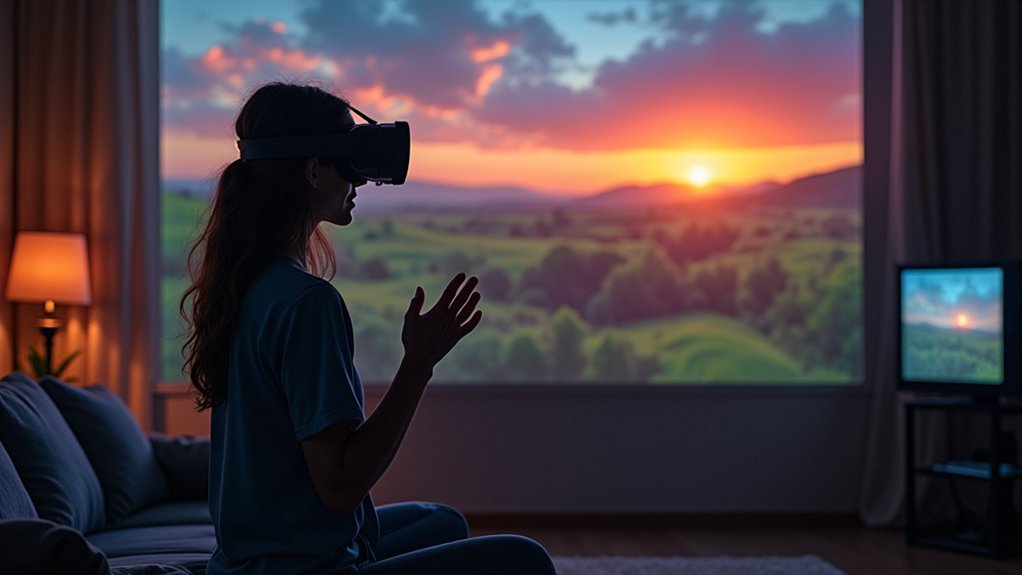
You can tackle negative thought patterns more effectively when VR places you directly into realistic scenarios that mirror your daily challenges.
These immersive environments let you identify distorted thinking as it happens and practice healthier responses without real-world consequences.
The safe virtual space gives you freedom to experiment with new cognitive strategies until they become natural reactions.
Challenging Negative Thought Patterns
Although negative thought patterns can feel overwhelming and automatic, virtual reality offers a groundbreaking approach to practice cognitive restructuring in controlled, lifelike scenarios.
Through immersive experiences, you’ll visualize and manipulate your cognitive patterns while developing stronger mental health skills. This engaging technique for depression relief creates a safe space where you can challenge distorted thinking without real-world consequences.
VR’s controlled environment enhances traditional therapy methods by implementing imagery rescripting, allowing you to reframe traumatic memories and negative experiences.
You’ll practice identifying cognitive distortions, then actively replace them with balanced thoughts in realistic simulations.
- Experience enhanced learning retention compared to traditional cognitive restructuring methods
- Practice challenging negative thoughts in realistic but safe virtual environments
- Implement imagery rescripting techniques to reframe difficult memories
- Build confidence applying these skills to everyday situations
Safe Virtual Practice Environment
When you step into a virtual environment designed for cognitive restructuring, you’re entering a carefully crafted space where mistakes become learning opportunities rather than sources of anxiety. These immersive environments provide safe practice grounds for challenging distressing thoughts without real-world consequences.
Virtual reality enables active engagement with therapeutic materials through interactive scenarios. You’ll practice cognitive exercises in controlled settings, gradually building confidence before facing actual situations. The technology simulates social interactions realistically while maintaining emotional safety.
| VR Environment Type | Practice Focus | Depression Relief Benefit |
|---|---|---|
| Social Scenarios | Challenging negative self-talk | Builds confidence safely |
| Workplace Settings | Restructuring anxiety thoughts | Reduces anticipatory stress |
| Family Interactions | Processing difficult emotions | Improves communication skills |
This approach transforms cognitive restructuring from abstract concepts into tangible experiences, accelerating your therapeutic progress through repeated, stress-free practice sessions.
Participate in Virtual Social Interactions and Group Settings
How can virtual social interactions transform your experience with depression when traditional socializing feels overwhelming?
VR platforms offer immersive group settings that reduce social anxiety while maintaining meaningful connections. These virtual gatherings create shared experiences that combat isolation and improve depressive symptoms through enhanced social engagement.
Virtual reality’s immersive nature stimulates your brain’s reward system, helping alleviate anhedonia – that numbness where nothing brings joy. Research shows participating in these digital communities can greatly improve mood and serve as effective mental health treatment.
- Join virtual game nights or discussion groups to build genuine connections without real-world pressure
- Engage in VR group therapy sessions for structured community support and professional guidance
- Participate in creative collaborative activities that foster teamwork and accomplishment
- Attend virtual events matching your interests to discover like-minded communities naturally
Incorporate Physical Movement With VR Exercise Programs
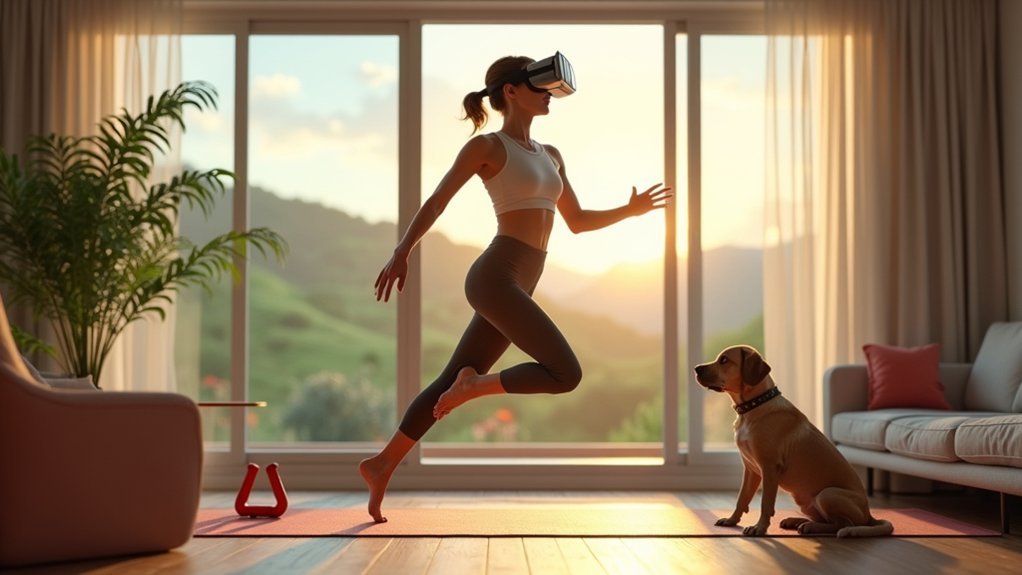
You can transform your depression treatment by combining VR technology with physical exercise through engaging fitness games like virtual boxing, tennis, or dance programs.
Modern VR systems track your movements precisely, providing real-time feedback that helps you maintain proper form while monitoring your progress and calorie burn.
These platforms let you customize workout intensity levels to match your current fitness and energy levels, making it easier to stay consistent even during challenging mental health days.
VR Fitness Game Options
Beat Saber, BoxVR, and similar VR fitness games transform exercise from a mundane chore into an engaging adventure that can greatly boost your mood while fighting depression.
These immersive VR exercise experiences release endorphins that naturally combat depressive symptoms while improving your overall fitness. You’ll find customizable workouts that adapt to your fitness level and physical limitations, ensuring accessibility regardless of your starting point.
- Beat Saber – Slice through musical beats with lightsabers for an intense cardio workout
- BoxVR – Throw punches to rhythmic beats in high-energy boxing sessions
- Supernatural – Explore stunning landscapes while performing full-body movements
- FitXR – Join multiplayer classes for social interaction and community support
These VR fitness games enhance motivation and promote long-term adherence to physical activity, making them valuable tools for managing mental health conditions.
Movement Tracking Technology Benefits
Movement tracking technology transforms VR exercise into a powerful depression-fighting tool by capturing your real-world movements and translating them into meaningful virtual actions. This technology promotes behavioral activation by encouraging participation in enjoyable physical activities like virtual tennis or boxing, leading to endorphin release and mood enhancement.
| Benefits | Impact on Depression Relief |
|---|---|
| Physical Movement Integration | Activates natural endorphin production |
| Sense of Control | Builds agency over your activities |
| Customizable Intensity | Adapts to your fitness level |
| Interactive Engagement | Maintains motivation through gamification |
| Accessibility Features | Accommodates mobility limitations |
VR exercise programs utilizing movement tracking technology create better mental health outcomes through their interactive nature. You’ll establish control over your physical activities while accessing tailored virtual reality experiences that enhance your depression management journey.
Customized Exercise Intensity Levels
When VR exercise programs incorporate customized intensity levels, they create personalized pathways for depression relief that adapt to your current physical and emotional state.
These virtual reality environments let you adjust physical activity to match your fitness level while maximizing antidepressant effects through behavioral activation.
- Gradual progression builds confidence – Start with low-intensity VR boxing or tennis, then increase difficulty as your motivation grows.
- Enhanced engagement through personalization – Tailored intensity keeps you invested in enjoyable activities without overwhelming your system.
- Improved mood through achievable goals – Customized settings guarantee consistent success, promoting sustained participation and depression relief.
- Combats anhedonia effectively – Immersive, rewarding experiences help restore pleasure in physical activities, transferring benefits to real-life engagement.
This personalized approach transforms exercise into an accessible tool for mood improvement.
Use Avatar Therapy to Address Self-Critical Thoughts
Since self-critical thoughts often feel overwhelming and difficult to challenge directly, avatar therapy offers you a unique opportunity to externalize and confront these internal voices through virtual representation.
You’ll create a digital version of yourself that helps you visualize and address negative self-talk in a controlled environment.
These immersive experiences enhance emotional engagement, making it easier to process difficult feelings.
Through avatar therapy, you can experiment with different perspectives, promoting cognitive restructuring by challenging harmful beliefs about yourself.
You’ll gain valuable insights into behaviors and emotional patterns that contribute to depression.
This approach fosters self-compassion as you learn to treat yourself with the same kindness you’d show others, ultimately improving mental health outcomes and providing effective depression relief.
Create a Consistent VR Treatment Schedule for Maximum Benefits
While building skills through avatar therapy provides powerful insights, you’ll maximize your depression relief by establishing a structured VR treatment routine that reinforces these therapeutic gains.
A consistent schedule enhances engagement and creates lasting positive changes in your mental health.
Research shows that regular virtual reality sessions produce better outcomes than sporadic use. You’ll need commitment to VR therapy for meaningful progress tracking and sustained motivation improvements.
- Schedule at least three VR sessions weekly to maintain momentum and reduce withdrawal feelings
- Diversify your immersive experiences with virtual sports, social gatherings, and tours to prevent monotony
- Monitor mood changes after each session to identify effective patterns and adjust accordingly
- Use VR gains as stepping stones to encourage participation in real-world activities and reduce depressive symptoms
Frequently Asked Questions
How Can VR Help With Depression?
VR helps you engage in immersive, enjoyable activities that combat depression’s withdrawal tendencies. You’ll find increased motivation for real-world interactions, reduced PHQ-9 scores, and accessible therapy that’s especially beneficial if you’ve mobility limitations.
What Are 5 Coping Skills for Depression?
You can practice deep breathing exercises, maintain regular sleep schedules, engage in physical activity, challenge negative thoughts through journaling, and connect with supportive friends or family members regularly.
Is There an Online Support for Depression and Anxiety?
You’ll find extensive online support through platforms like 7 Cups and BetterHelp, which connect you with mental health professionals. Support groups through ADAA and NAMI offer peer communities for sharing experiences.
How to Calm Down From Depression?
You can calm down from depression by practicing deep breathing exercises, taking short walks outside, listening to soothing music, or engaging in mindfulness meditation to help regulate your emotions effectively.
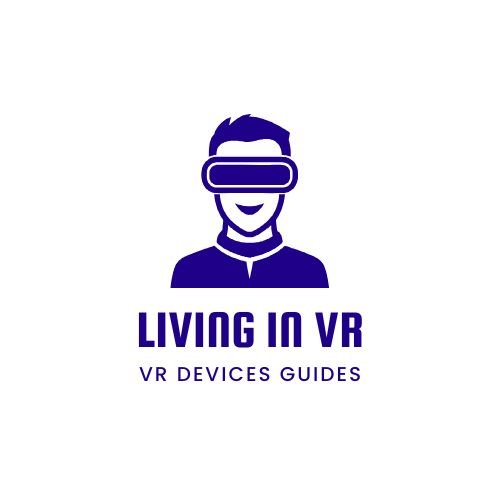
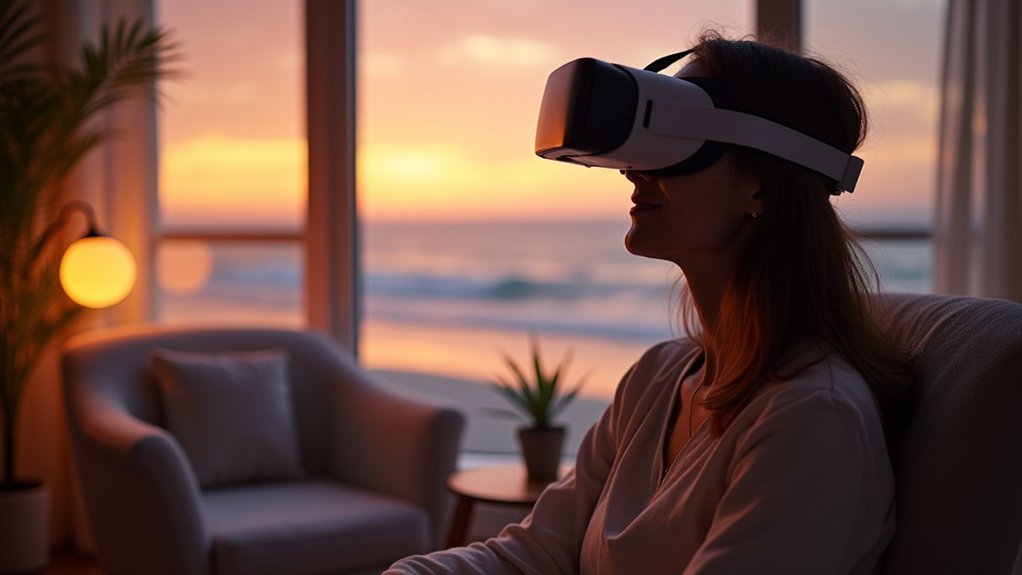
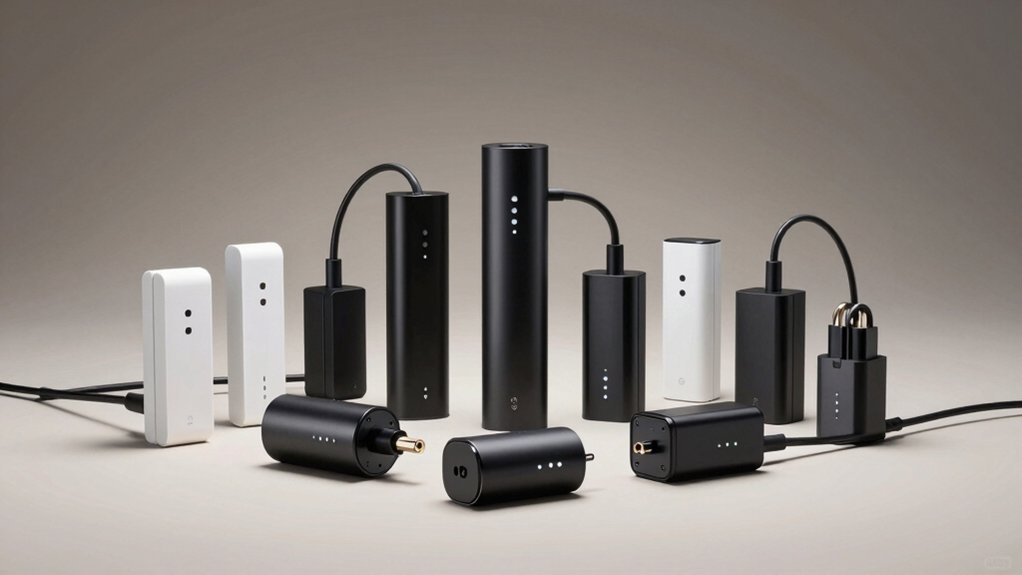
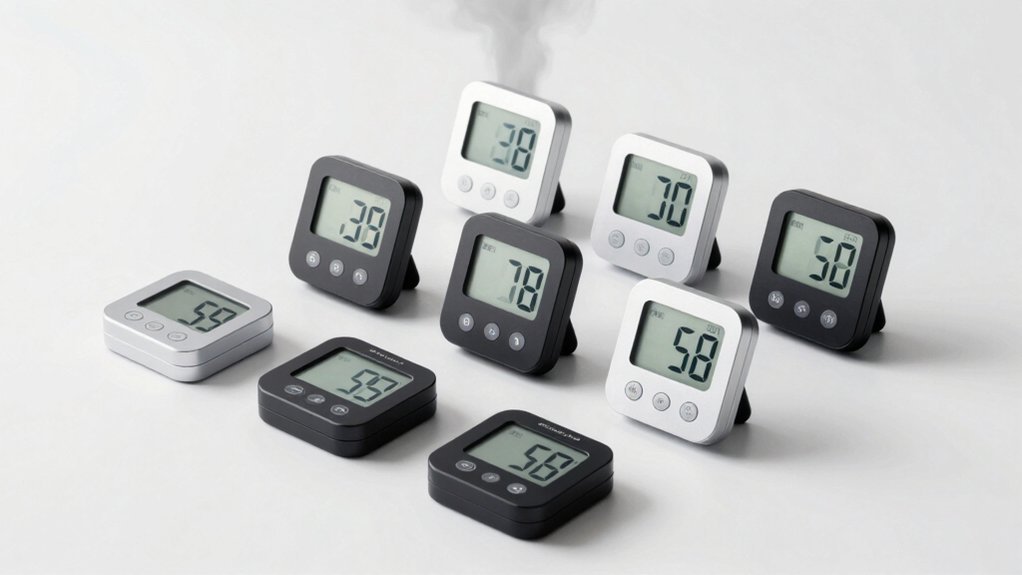
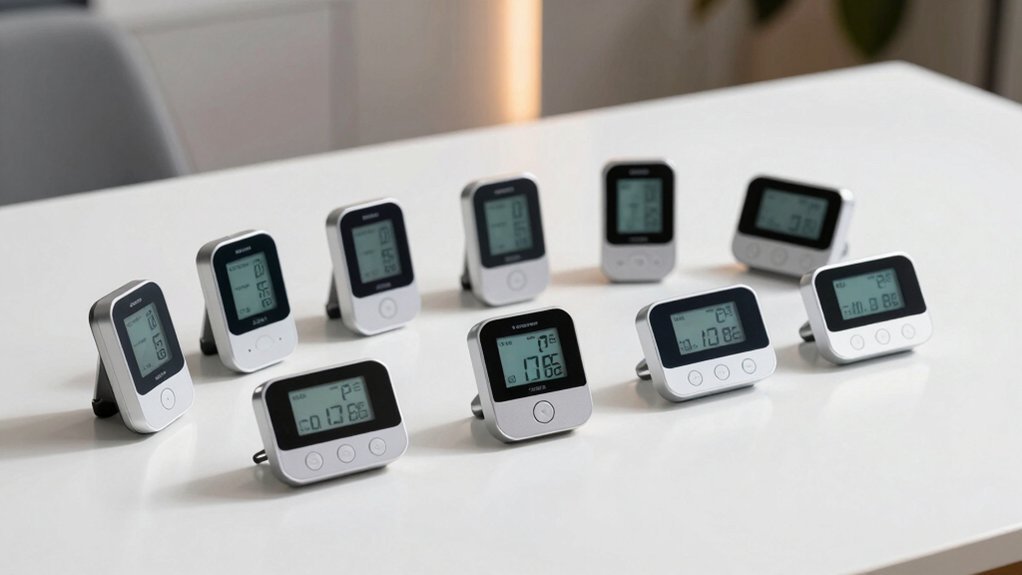
Leave a Reply